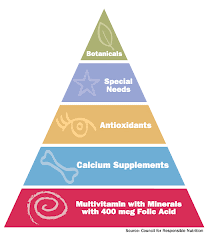What are Dietary Supplements?
There is currently a great deal of confusion surrounding the use of dietary supplements. Congress defined the term "dietary supplement" in the Dietary Supplement Health and Education Act (DSHEA) of 1994. A dietary supplement is a product taken by mouth that contains a "dietary ingredient" intended to supplement the diet. The "dietary ingredients" in these products may include: vitamins, minerals, herbs or other botanicals, amino acids, and substances such as enzymes, organ tissues, glandulars, and metabolites. Dietary supplements can also be extracts or concentrates, and may be found in many forms such as tablets, capsules, soft gels, gel caps, liquids, or powders. They can also be in other forms, such as a bar, but if they are, information on their label must not represent the product as a conventional food or a sole item of a meal or diet. Whatever their form may be, DSHEA places dietary supplements in a special category under the general umbrella of "foods," not drugs, and requires that every supplement be labeled a dietary supplement.
Source: FDA
What are the implications to you as a health care professional and a consumer?
In order to be educated consumers and soon to be nurses it is important to realize the facts and myths about dietary supplements. In order to help provide the best care for your patients it is your responsibility to ask the questions, and provide the answers to many questions your patients might have. For example, a patient comes into the hospital for high cholesterol, and is prescribed Lipitor to lower their LDL levels. It is your responsibility, as a proactive nurse, to ask the patient what
medications they have taken to realize if there might be any contraindications for giving a certain drug. It is important to verbalize to patients that dietary supplements, including herbs, are considered drugs, and can result in adverse reactions. Now consider this patient believes they have mild signs of depression and researched that St. Johns Wort is a natural remedy to depression. This might be acceptable except for the fact that Lipitor is a category X drug, and that taking St. Johns Wort can lower the effectiveness of the birth control medicine they are currently taking.
Why is this a hot topic issue?
Dietary supplements are compounds that have been around for sometimes thousands of years, even before some of the more common medications that are available today; however the issue has never been more important than now. With the continuous rise of
medical errors it is important for consumer and health care providers to be aware of not only the facts about dietary supplements but the myths which we will elaborate on in this blog.
If the health care provider is aware of the common myths, they can be proactive in talking to their patients, and assessing their current ideas about dietary supplement and some of the risks involved. By acknowledging that patients consume dietary supplements, adverse reactions can be avoided not only in the hospital but in outpatient treatment as well. Consumers also need to be advised that dietary supplements do just that, supplement the diet, they are not intended to replace certain foods.
Are Dietary Supplements safe?
Some dietary supplements may be harmful under some conditions. For example, many herbal products and other "natural" supplements have real and powerful pharmacological effects that can cause harmful reactions in some people or can cause dangerous interactions with prescribed or over-the-counter medicines. It does not necessarily mean that supplements marketed as "natural" are safe and without side effects.
This begs the question: “If the dietary supplements that I can buy over-the-counter are not safe, then why are they not being monitored better?” The Food and Drug Administration's (FDA) review of the safety and efficacy of these products is significantly less than for drugs and foods. Consumers must be cautious about using any supplement that claims to treat, prevent or cure a disease. The FDA has approved very few claims for labeling. Exceptions are based on a review of certain scientific evidence gathered through research. An example is that claims about folic acid supplements taken during pregnancy and a correlated decreased risk of neural tube birth defects.
It is critical that we all read carefully and think critically about the claims we see on the packages of dietary supplements. As health care professionals, we should be especially vigilant about discovering and educating our patients about the concerns and warnings involved in self-medicating with dietary supplements.
Tuesday, December 9, 2008
Subscribe to:
Posts (Atom)

